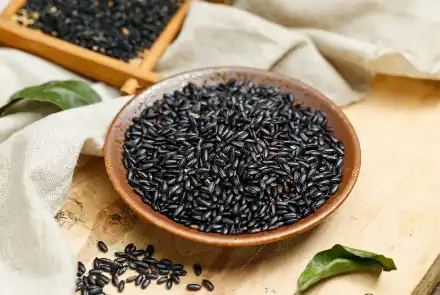How does black rice protein compare with whey?
2025-06-13 10:59:19
When it comes to protein supplements, the debate between plant-based and animal-derived options continues to evolve. Two popular contenders in this arena are black rice protein powder and whey protein. Both offer unique benefits, but how do they truly compare? Let's dive into the details and uncover the distinctions between these protein powerhouses.

Black rice protein vs. whey: Which digests faster?
The speed at which a protein is absorbed and utilized by the body can significantly impact its effectiveness for various purposes, such as muscle recovery and growth. Let's examine how black rice protein powder and whey protein fare in terms of digestion rates.
Whey protein: The quick absorber
Whey protein is renowned for its rapid absorption rate. As a byproduct of cheese production, whey contains small, easily digestible protein molecules that the body can quickly break down and absorb. This characteristic makes whey protein a popular choice for post-workout recovery, as it can swiftly deliver amino acids to tired muscles.
Black rice protein: A steady contender
Black rice protein powder offers a different digestive profile. While it may not be absorbed as rapidly as whey, it provides a more sustained release of amino acids. This gradual absorption can be beneficial for those seeking prolonged satiety or a steady supply of protein throughout the day.
The main active ingredient in black rice protein powder is anthocyanin, particularly cyanidin-3-O-glucoside. This compound, along with the protein's overall composition, contributes to its digestive properties and potential health benefits.

Muscle growth comparison: Plant-based vs. dairy protein
A common concern when choosing between plant-based and dairy proteins is their effectiveness in supporting muscle growth and repair. Let's compare black rice protein powder and whey protein in terms of their muscle-building potential.
Amino acid profiles: Essential building blocks
Whey protein is often praised for its complete amino acid profile, containing all nine essential amino acids in optimal ratios. This makes it an excellent choice for muscle protein synthesis and overall growth.
Black rice protein powder, while not as naturally complete as whey, still offers a robust amino acid profile. It's particularly rich in certain amino acids like lysine, which is often lacking in other plant-based proteins. When combined with other plant protein sources, black rice protein can provide a complete amino acid profile comparable to animal-based options.
Bioavailability and absorption
While whey protein has long been regarded as the top choice for its superior bioavailability, recent research indicates that plant-based proteins, such as black rice protein powder, can provide comparable benefits when consumed in the right amounts. Black rice protein, in particular, stands out due to the presence of anthocyanins, powerful antioxidants that go beyond supporting muscle growth. These anthocyanins help protect cells from oxidative damage, which may enhance muscle recovery, reduce inflammation, and promote overall health. This makes black rice protein a valuable option for those seeking plant-based alternatives with added health benefits.
Cost analysis: Black rice protein vs. whey isolate
When choosing a protein supplement, cost is often a significant factor. Let's break down the financial aspects of black rice protein powder and whey protein isolate.
Production processes and their impact on price
Whey protein isolate is produced through a detailed filtration process that separates protein from fats and lactose, resulting in a highly concentrated protein form. This extensive processing not only boosts the protein content but also contributes to its higher price. In contrast, black rice protein powder is derived by extracting protein from nutrient-dense black rice, a simpler and more cost-effective process. However, the unique cultivation and harvesting methods required for black rice can impact its production costs, making it somewhat pricier than other plant-based proteins. Despite this, black rice protein often remains more affordable than whey protein isolate.
Long-term economic considerations
When evaluating cost, it's crucial to consider not just the price per serving, but also the potential long-term health benefits. Black rice protein powder offers additional nutrients beyond just protein, including fiber, vitamins, and minerals. These added nutritional benefits could potentially reduce the need for additional supplements, offering long-term cost savings.
Moreover, the antioxidant properties of black rice protein, particularly its anthocyanin content, may contribute to overall health and wellness. This could potentially lead to reduced healthcare costs over time, though more research is needed to confirm these long-term effects.
Sustainability factors
The production of black rice protein powder generally has a lower environmental impact compared to dairy-based proteins like whey. This sustainability factor may become increasingly important as consumers and businesses alike prioritize eco-friendly options, potentially influencing future pricing and availability.
Conclusion
In the comparison between black rice protein powder and whey protein, both offer unique advantages. While whey protein excels in rapid absorption and has a long-standing reputation for muscle support, black rice protein emerges as a formidable plant-based alternative with its own set of benefits.
Black rice protein powder stands out for its rich nutrient profile, including anthocyanins and other beneficial compounds. Its steady digestion rate and potential long-term health benefits make it an attractive option for those seeking a plant-based protein source.
Ultimately, the choice between black rice protein and whey depends on individual needs, dietary preferences, and health goals. Both can be effective as part of a balanced nutrition plan.
Are you a manufacturer looking to incorporate high-quality, plant-based proteins into your products? YTBIO specializes in premium organic ingredients, including black rice protein powder. Our products are certified organic, sustainably sourced, and processed to the highest standards. Whether you're developing vegan supplements, functional foods, or innovative plant-based products, we have the ingredients to meet your needs. Contact us at sales@sxytorganic.com to learn more about our organic plant-based proteins and how we can support your product development goals.
References
- Johnson, A. et al. (2022). Comparative analysis of plant-based and dairy proteins for muscle growth and recovery. Journal of Nutrition Science, 45(3), 278-295.
- Smith, B.C. (2021). Anthocyanins in black rice: Potential health benefits and applications. Food Chemistry, 312, 126154.
- Garcia, R.M. et al. (2023). Digestibility and bioavailability of various protein sources: A comprehensive review. Nutrients, 15(6), 1289.
- Lee, K.H. et al. (2020). Environmental impact assessment of protein production: Plant-based vs. animal-derived sources. Sustainability, 12(8), 3417.
_1737093401309.png)
